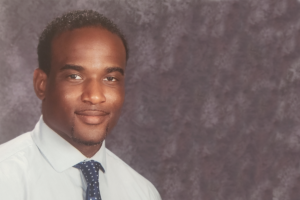
As a professional educator, Caston Binger has spent the last 15 years working in the city of Rochester. A classroom teacher for much of that time, he has recently accepted a leadership position as an assistant principal, a role that allows him to interact and support not just a single class, but rather all of the students in his elementary school.
Born and raised in Niagara Falls, New York, Caston spent his formative years at LaSalle Senior High School where he excelled in athletics, especially basketball. He was awarded a prominent spot on the varsity basketball team, and was a major contributor to them winning back-to-back New York State Class A Championships in 1995 and 1996. Upon graduating high school, he enrolled in the State University of New York, SUNY Cortland, and was recruited to that institution’s men’s basketball team, as well. That team won the State University of New York Athletic Conference (SUNYAC) championship in 2000, in addition to appearing in the ‘Sweet 16’ Division lll tournament.
As for his academic career, Caston Binger initially earned an BA in Elementary Education, and then proceeded to earn an MA in Educational Supervision and Administration. In May 2021, Caston made the decision to further augment his qualifications in the field of education, earning another master’s degree, this time with a special focus on School Leadership.
A perennial optimist, Caston Binger is also an educator with a well-defined philosophy. It is his firm belief that the work done in schools has a profound impact on student development, resilience, and, ultimately, success. Caston’s overall approach is designed to provide leadership that fosters a safe, supportive, and inclusive learning community, contributing to the academic achievement of all students.
What do you currently do at your organization?
For a long time, I was a typical elementary school classroom teacher, and I loved it. There’s just something about guiding kids and watching them learn and discover things in real time that filled me with joy and hope for the future.
Recently, though, I have accepted a new role as a Teacher on Special Assignment, which is a more expansive role. Instead of being charged with a single class, my purview is now every student in the school. My duties are varied. I spend some days observing classroom lessons and giving teachers feedback about what I see. I spend other days in various instructional meetings and discussions about different aspects of school improvement. There are days I have to manage a crisis, but thankfully those days are relatively rare. As you might imagine, a crisis involving staff members or students can be challenging and demand more time than some of my other responsibilities. And it’s totally impossible to anticipate events like that ahead of time, so I have to come in mentally prepared for anything every day. It’s an interesting job and I’m enjoying it a lot.
What defines your way of doing business?
If I had to point to one thing, it would be collaboration. I’m a big believer in soliciting feedback from all parties involved in the educational process; teachers, students, parents, and sometimes even just ordinary members of the community. It’s important for everyone to know that their input is welcomed and valued. And while the school may not always implement every suggestion from its stakeholders, everyone is always aware that they are a part of the decision-making process on everything from changes in the curriculum to changes in the school’s operational policies.
What keys to being productive can you share?
Personally, I find that I’m at my most productive when I leave my office and explore the school. There’s a lot to be gained by interacting with the students and staff members during the course of their day-to-day activities. I learn a lot that way. In that vein, I also try to be present and visible during student arrival in the morning and at dismissal in the afternoon, as this gives me an opportunity to talk to the parents and find out what’s on their minds. Beyond that, I visit various classrooms throughout the day to experience the student/teacher dynamics, and I converse with students in a more unofficial capacity during their lunch periods. Authentic interactions like these help me to understand more about the students’ educational experiences and lives, and ultimately build more solid bonds with them. These interactions also help me grasp a better sense of the overall mood in the school.
Tell us one long-term goal in your career.
In the near-term, it is my hope to assume an executive role in my school; either vice-principal or principal. In the long-term, I hope to one day work for the school district and use my skills and experience to implement changes for the better on a wide scale.
What are some of your favorite things to do outside of work?
I have a twin brother, and we flip houses during our free time. Most of the time it’s a fun exercise in problem-solving, and if we’re lucky, a profitable one, too. It’s also a great way to spend time together, as we both have busy lives. I also love basketball. I’ll play a pick-up game with my friends whenever I have the chance, and I follow what’s happening in the NBA, WNBA, NCAA, and local school matches.
How do you measure success?
I measure my success based on how effective the school is at providing quality education for our students. Outside of keeping them safe and cultivating a welcoming and inclusive environment in which they can thrive, that is my primary mission. Many of our students go on to fantastic schools and achieve magnificent things academically, so that’s an easy way to gauge our success.
What advice would you give to aspiring to succeed in your field?
Teaching in theory is quite a bit different than teaching in practice. When a new teacher joins the staff, it’s common for them to want to take on a little more than they’re actually capable of accomplishing. I totally get it, too. It’s natural to want to help the kids as much as humanly possible. But I guess my advice for new teachers is this: burnout is a real thing. It affects nearly everyone in the profession at some point or another. Sometimes, it’s best not to assume too many responsibilities, because if you start getting overly fatigued or burnt out, your ability to teach will suffer, and that way everyone loses—especially the students. To that end, it’s important to pay attention to self care and get a lot of rest. After all, teaching can be a very difficult, very tiring vocation.
Read more:
Getting to Know You: Caston Binger, Educator





